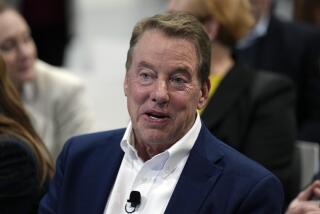AutoNation’s CEO Sees Strength in Luxury
- Share via
Car dealers are typically optimists. They can be counted on to see the glass as half full. So when the chief executive of the country’s biggest auto retailer delivers a stern message to the troops, his words carry particularly grim weight.
“Rising interest rates are going to pop the bubble in real estate, and that, combined with rising gas prices, is toxic to the consumer,” AutoNation Inc. Chairman and CEO Mike Jackson said in an interview last week.
Jackson, who was in town to deliver that warning in a speech to 2,500 employees of AutoNation’s 38 Southern California dealerships, even used the R-word in discussing the outlook for the rest of the year: “The question is, how bad a recession” is on the way?
So far, auto sales haven’t suffered much, although some brands and product types are certainly hurting. Profit per vehicle is down as manufacturers and dealers pile on discounts to move metal.
Part of Jackson’s strategy for weathering an economic downturn is to concentrate on luxury brands. Toyota Motor Corp.’s Lexus, DaimlerChrysler’s Mercedes-Benz and BMW account for 22% of AutoNation’s sales, up from 11% in 1999.
“The environment in premium luxury is still quite good because there’s a strong, positive demographic,” the 58-year-old executive said.
“Baby boomers are not going quietly into the night. They have wealth, income and they are enjoying themselves.”
There has been a slide in pickup trucks but not, as conventional wisdom has it, because they are gas guzzlers whacked by rising fuel prices, Jackson said.
Although a luxury-appointed pickup can be a fashion statement in areas such as Southern California and South Florida, big trucks are still work vehicles in much of the country.
“Farmers, construction workers -- that’s who buys most of them,” Jackson said.
And they are affected far less by gas prices than the rising interest rates that have slowed the housing market.
“We are seeing a big pause in pickup purchases as they try to figure out what’s going to be happening,” he said.
The survival recipe Jackson passed on to dealers was to remember that “you are there to help the customer.” Buyer satisfaction with a dealership’s sales and service departments is what keeps customers and revenue coming in.
Service has become doubly important, Jackson said, because if people aren’t willing to buy new vehicles, they will spend more money keeping their old ones running.
Most pundits see 2006 as a pretty strong year in total volume, with sales of about 16.5 million new cars and trucks.
But General Motors Corp. and Ford Motor Co. are losing market share and rethinking their U.S. strategies in the face of the market’s shift away from large pickups and sport utility vehicles and an onslaught of foreign competition.
AutoNation, based in Fort Lauderdale, Fla., has 345 franchises in 269 dealerships in 17 states.
The company appears to be on track to equal last year’s revenue, posting $9.7 billion in sales for the first half this year, up slightly from $9.4 billion a year earlier. Net income, however, was down considerably to $159.9 million through June. That compares with $291.8 million for the first six months of last year, but that figure was inflated by a one-time $128-million tax gain.
One thing in AutoNation’s favor: It has been increasing its foreign brand franchises and shrinking its exposure to traditional domestic brands since Jackson -- formerly president of Mercedes-Benz of North America -- became AutoNation chief executive in 1999.
“We were more than 60% domestic six years ago,” he said. “Now we’re less than 40%.”
GM and Ford “have done many things right” as they try to bounce back from their recent reversals in the U.S. market, Jackson said. “Both are in better competitive shape than they were 10 years ago,” he said. “But the competition has gotten tougher too.”
In the battle for market share, he noted, “it’s difficult to win it back if the competitors are still better.”






